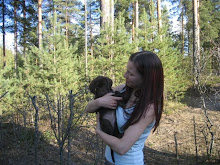
All animal species have the same learning process. Example special and breed features, genome, predilections and fears, experiences and healthiness are factors that determine animal`s behavior and learning, and help us to decide what kind of behavioral psychology approach we should use to a certain individual in a certain situation.
Animal`s behaviorism is based on scientific studies. Modern theory of animal behavior has its roots in 1920s, Ivan Pavlov`s discovery of classical conditioning. Opponent to classical conditioning is operant or instrumental conditioning. B.F. Skinner conducted research of operant conditioning in 1960s, but American psychologist E.L. Thorndike found it already in 1910s. Classical and operant contioning can explain most of the animal`s learning processes. However there is some forms of learning in animal`s commerce that can not be explained by conditioning theories. Modern zoological research is very interested in animal`s social learning.


No comments:
Post a Comment